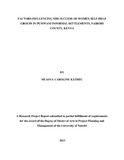| dc.description.abstract | The purpose of this study was to investigate the factors influencing the success of Women Self Help Groups in Pumwani informal settlements, Nairobi. SHGs are small informal associations created for the purpose of enabling members to reap economic benefit out of mutual help, solidarity and joint responsibility. The benefits include mobilization of savings and credit facilities and pursuit of group enterprise activities. Therefore, the success of these SHGs is pertinent to ensure that women become economically empowered. The main purpose of the self-help groups is to ensure that women are economically and socially empowered hence contributing to improved livelihoods. If the self-help groups disintegrate, then their original purpose will not be achieved. The study of the factors that influence the success of women self-help groups was critical to ensure that self-help groups become successful and that women and their households livelihoods is improved. The study was guided by five objectives, that is, to establish how group rules, regular savings and borrowing of loans, trainings provided to the women, regular group meetings and maintenance of records influence the success of women self-help groups in Pumwani Informal settlements, Nairobi County. The study targetted 29 WSHGs in Majengo and 13 in Kiambiu of Pumwani Informal settlements. A total of 9 WSHGs (20%) were selected for the study. The study employed a descriptive survey design. Open ended questionnaires were administered to all the members WSHGs selected for the study. Key informant interviews were conducted with the leaders of the 9 selected WSHGs, 2 community facilitators and the Economic empowerment program officer at St. John‟s Community Centre which has been at the fore front in forming the WSHGs. Documentary review was also done to check on the presence and use of the documents kept by the WSHGs. To establish reliability of the instruments, a pilot study was carried out and the split half method was used. A correlation co-efficient of 0.75 was obtained and this showed that the instruments were reliable. The pilot study also helped to establish validity of the instruments. Data analysis was done using both qualitative and quantitative techniques. Frequency tables were used to summarize the quantitative data. Multiple regression was done to measure the strength of the relationship between the dependent and independent variables. Qualitative data was analyzed using themes reflecting the research objectives. The findings revealed that group rules, regular saving and borrowing of loans and regular group meetings contribute to a great extent to the success of WSHGs as compared to group records and the trainings provided to the women. The study recommends that the WSHGs should set a minimum and maximum amount of money that members should save on a weekly basis, WSHGs should be linked to Micro-finance institutions to access credit facilities, the WSHGs should be provided with need based trainings | |

